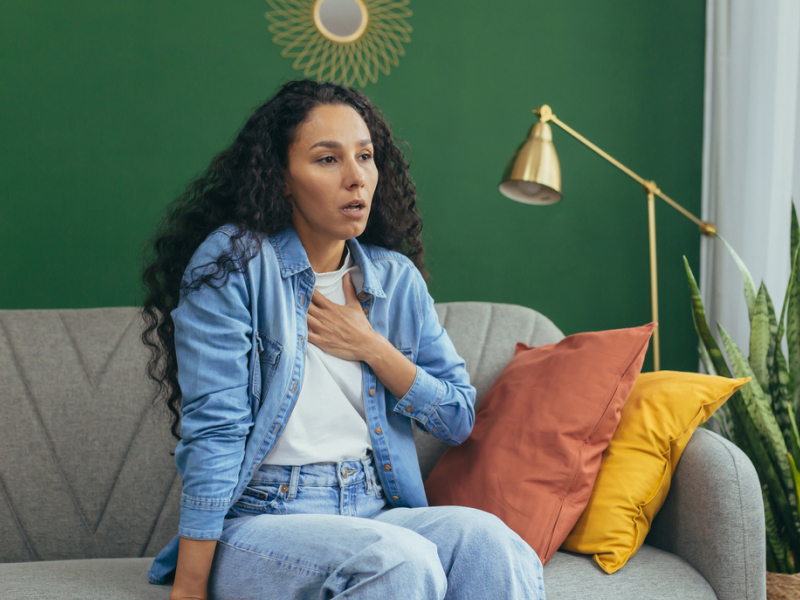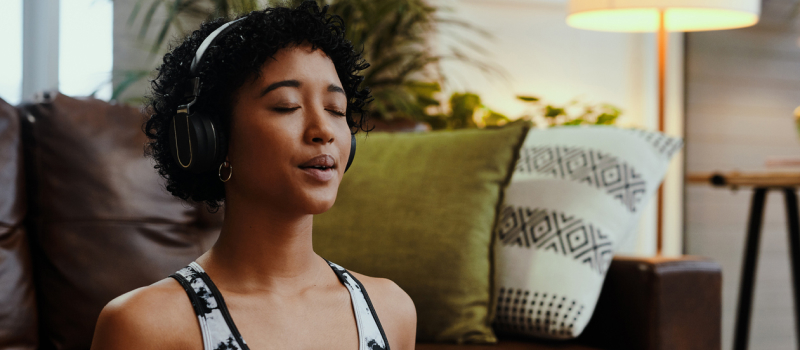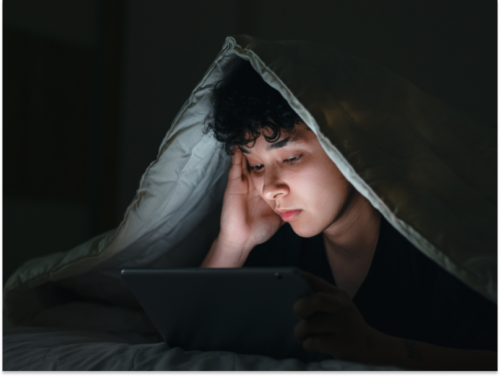
Table of Contents
Is It Shortness of Breath or Anxiety?
Written By: Charlie Health Editorial Team

Clinically Reviewed By: Dr. Don Gasparini
February 22, 2024
5 min.
If shortness of breath comes on suddenly, doesn’t go away with relaxation techniques, and isn’t related to another medical cause, it could signal anxiety.
Learn more about our Clinical Review Process
Table of Contents
Shortness of breath, or dyspnea, can be a distressing symptom that may arise from various medical conditions, including asthma, allergies, or respiratory infections. However, it’s essential to recognize that shortness of breath can also be a symptom of an anxiety disorder or panic attack.
When experienced during an anxiety or panic attack, dyspnea is often accompanied by feelings of intense fear or impending doom. Understanding that shortness of breath is from an anxiety disorder is crucial for addressing the underlying reasons associated with your breathing difficulties.
Below, we will explore how to tell if shortness of breath is caused by anxiety, other possible causes, and how to alleviate the feeling of dyspnea.
Join the Charlie Health Library
Get mental health updates, research, insights, and resources directly to your inbox.
You can unsubscribe anytime.
How to tell if shortness of breath is from anxiety
Shortness of breath can be a common symptom of anxiety, and identifying this can help you take the first steps in seeking treatment. If you’re experiencing shortness of breath and wondering if it’s related to anxiety, here are five signs to look out for:
1. Sudden onset
Anxiety-related shortness of breath often comes on suddenly and may be triggered by stressful situations or anxiety-inducing thoughts.
2. Difficulty breathing in
People with anxiety-related shortness of breath may find it challenging to take a deep breath or feel like they can't get enough air, even though their lungs are functioning normally.
3. Other anxiety symptoms
Shortness of breath is often accompanied by other symptoms of anxiety, such as an increased heart rate, sweating, trembling, chest pain, and chest tightness.
4. Relief with relaxation techniques
Breathing exercises, relaxation techniques, or calming activities like meditation or mindfulness may help alleviate shortness of breath due to anxiety.
5. No other medical cause
If you've ruled out other health conditions that could cause shortness of breath, such as asthma, allergies, or respiratory infections, and your symptoms persist during periods of anxiety or stress, it's more likely to be anxiety-related shortness of breath.

Does anxiety cause shortness of breath?
Yes, anxiety can cause shortness of breath. When people experience anxiety, their body’s natural stress response can lead to various physical symptoms, including dyspnea. This can occur due to hyperventilation, where rapid breathing causes an imbalance in oxygen and carbon dioxide levels in the body, leading to feelings of breathlessness. Also, anxiety can trigger muscle tension in the chest and throat, making it feel more challenging to breathe.
While shortness of breath can be alarming, especially during anxiety attacks, it typically does not pose a severe threat and often resolves once the anxiety subsides. However, if you're experiencing frequent or severe shortness of breath due to anxiety, it's essential to consult with a mental health professional for proper evaluation and guidance.
Other causes of shortness of breath
Shortness of breath can be caused by various factors other than anxiety, including:
- Medical conditions
- Allergies
- Physical activity
- Smoking
- Heart attack
- Infections
- Medication
If you're unsure whether your shortness of breath is related to anxiety, you should seek support from a healthcare professional for a proper evaluation. They can help determine the underlying cause of your symptoms and work with you to find appropriate treatment options.
How do you get rid of shortness of breath from anxiety?
As mentioned, while shortness of breath does not pose a serious threat, it can feel distressing during an anxiety attack. There are various tools you can use that can help alleviate the feeling of anxiety-related shortness of breath, including breathing exercises, grounding techniques, and social support.
To alleviate shortness of breath caused by anxiety, here are some strategies you can try:
Deep breathing
Practice deep breathing exercises to help regulate your breathing and calm your nervous system. Belly breathing, also known as diaphragmatic breathing, is a helpful technique for managing anxiety as it promotes relaxation and helps regulate the body's stress response. Pursed lip breathing is another valuable technique that utilizes exhaling through pursed lips to alleviate shortness of breath.
Mindfulness techniques
Engage in mindfulness meditation, progressive muscle relaxation, or somatic exercises to help reduce anxiety and promote a sense of calmness. Using a relaxation technique when you feel dyspnea can alleviate breathing symptoms.
Grounding techniques
Use grounding techniques to help bring your focus back to the present moment and distract yourself from anxious thoughts. For example, focus on the sensations of your feet touching the ground or describe objects around you in detail.
Regular physical activity
Regular physical activity can help reduce anxiety and improve overall well-being. Engage in activities like walking, jogging, yoga, or swimming to help manage shortness of breath as an anxiety symptom and promote relaxation.
Emotional support
Talk to a trusted friend, family member, or mental health professional about your feelings of anxiety and shortness of breath. They can provide support, guidance, and coping strategies to help you manage your symptoms effectively.

Practice acceptance
Accept that shortness of breath is a common symptom of anxiety and remind yourself that it is temporary and will pass. Try not to fight against the feeling, but allow yourself to experience it without judgment. Journaling your thoughts and feelings may help you process acceptance and manage your anxiety.
Seek professional help
If your symptoms persist or significantly impact your daily functioning, consider seeking professional help from a therapist or counselor who can provide anxiety treatment tailored to your needs. Cognitive behavioral therapy (CBT) is a proven treatment for anxiety disorders, including generalized anxiety disorder, panic disorder, and social anxiety disorder.
Mental health treatment at Charlie Health
If you or a loved one are struggling with anxiety, Charlie Health is here to help. Charlie Health’s virtual Intensive Outpatient Program (IOP) provides more than once-weekly mental health treatment for dealing with complex mental health conditions, including anxiety. Our expert clinicians incorporate evidence-based therapies into individual counseling, family therapy, and group sessions. With treatment, managing your anxiety symptoms is possible. Fill out the form below or give us a call to start healing today.





